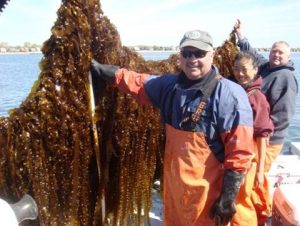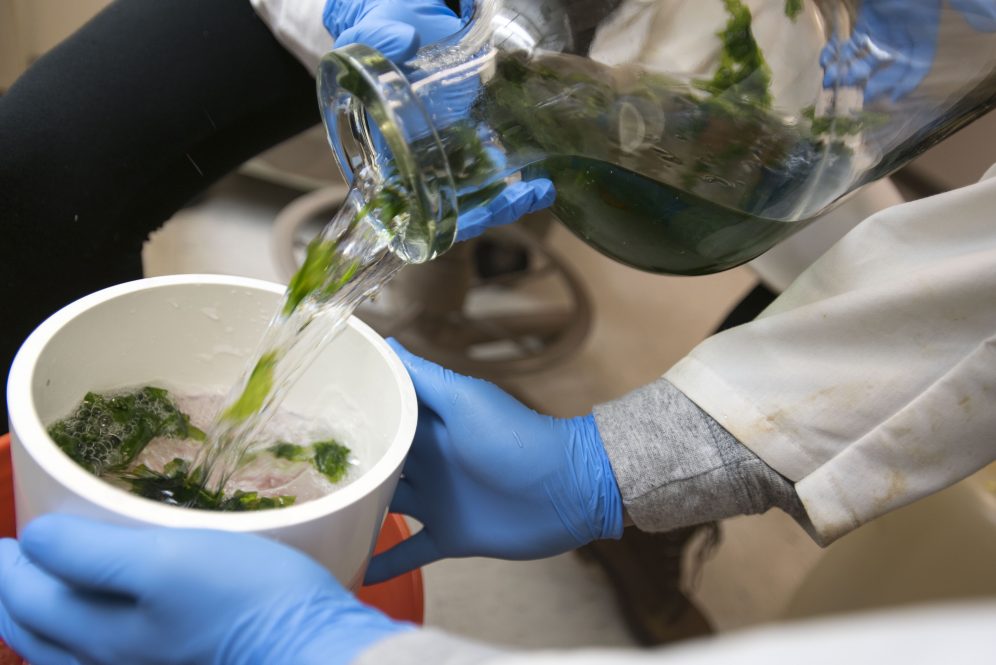A collection of 1,200 algae specimens with the potential to seed the sustainable production of human food, animal feed, nutritional supplements, biofuel, and more will be preserved under a licensing deal finalized in early June by the Technology Commercialization Services (TCS) of UConn’s Office of Vice President for Research.
The three-party agreement facilitated by TCS is between UConn, Woods Hole Oceanographic Institution (WHOI) and Bigelow Laboratory for Ocean Services, a non-profit oceanographic research lab in East Boothbay, Maine. The deal ensures that a collection of kelp germplasm taken from samples collected and isolated by UConn Emeritus Professor of Ecology and Environmental Biology Charles Yarish and his students over the past four years will be preserved for future cultivation and research.

Teams at UConn and WHOI developed and isolated the germplasm, which contain microscopic cells called gametophytes that act as seeds for the algae. Bigelow’s Provasoli-Guillard National Center for Marine Algae and Microbiota (NCMA) will maintain, market, and distribute the kelp culture collection for broad use.
The deal is the culmination of nearly nine months of painstaking effort and perseverance by Yarish and TCS that included culling through about 3,000 algae culture specimen to eliminate duplicates and identify the source of each sample.
Faced with having to shut down his lab at UConn, Yarish initially approached TCS for help preserving a separate collection of 237 samples of brown, red, and green algae from his lab. Abhijit Banerjee, Associate Vice President for Research, Innovation, and Entrepreneurship at OVPR, and Amit Kumar, Senior Director of Licensing at TCS, worked with Yarish to hammer out the details on that agreement, completed last November, and the latest one involving UConn, WHOI, and Bigelow.
“I give credit to Charles for reaching out to us and for working patiently to help us understand the value of this collection and negotiate a good deal,” says Kumar. “There are different ways our office can engage with university faculty and the work they do. One of those ways is to help them monetize their work.”
“We consider ourselves a strategic partner,” adds Banerjee. “We are all gatekeepers of intellectual property for the university. When we see this kind of sample and understand its worth in the world, we are absolutely compelled to preserve it. That’s the right thing to do for the university and the world. This is an example of how TCS rises above and beyond. We saved cultures that would not otherwise have survived.”
According to the Food and Agriculture Organization of the United Nations, global aquaculture production of seaweeds exceeds 34.7 million tons and has an economic value of $14.8 billion. Over 99% of production is in Asia, with China as the world leader, followed by Indonesia, the Philippines, South Korea, and Japan. Kelps from one group – Laminariales – accounted for approximately 47% of the total global production with an economic value of $7.7 billion.
Seaweed aquaculture is a relatively new industry in the U.S., but demand in American markets is rapidly increasing. In the coastal waters of New England, seaweed aquaculture is one of the fastest-growing maritime industries.
Yarish spent a great deal of time evaluating the best place to deposit the UConn seaweed culture collection. Based on discussions with colleagues, and his interest in having the collection available to the nascent seaweed industry in the U.S., he decided Bigelow’s NCMA would be the best home for this unique, economically, and ecologically important collection of seaweeds.
Bigelow has the capability to preserve the germplasm cultures in liquid and cryogenically and “will be able to shop the collection to various industries and get a reasonable rate of return on my investment of over 46 years and UConn’s investment,” he says.
Currently, macroalgae or seaweed is primarily cultivated as food for human consumption, but there are growing opportunities for other sustainable uses such as nutraceuticals, animal and aqua feeds, and biofuels. Other commercial uses include cosmetics, fertilizer, pharmaceuticals, medical therapeutics, and textile production. Algae germplasm is also an essential component of kelp restoration efforts in aquatic habitats adversely impacted by climate change or environmental disasters such as oil spills.
“This kelp culture collection will be essential for the preservation of heirloom strains, biodiversity conservation, ecosystem restoration and mariculture,” says Yarish, who is a visiting scholar at WHOI and co-authored a PLOS Biology paper and a UNU-CRIS paper further investigating aquaculture and germplasm banking. “It contains genotype and phenotype profiles offering great starting points as model systems for numerous research possibilities, including optimization of biorefining pipelines, development of new macroalgal products and byproducts, and exploration of macroalgal applications for climate change mitigation.”
Bigelow’s preservation and commercialization efforts are supported by the National Science Foundation (NSF) and ARPAe MARINER program (Macroalgae Research Inspiring Novel Energy Resources). The ARPAe MARINER program develops tools to enable the United States to become a global leader in the production of seaweed biomass.
The UConn-WHOI collection is also part of the Sugar Kelp Base, an online database developed by partners at the United States Department of Agriculture and Cornell University, WHOI and UConn, and designed to advance methods in kelp breeding. Sugar kelp is a vital part of the Northern Hemisphere’s ocean ecosystem, aiding in removing carbon dioxide and releasing oxygen, balancing ocean acidification, and serving as a sustainable food source. The Sugar Kelp Base tracks the performance of hundreds of family crosses for dozens of traits, covering the last four years of field trials funded by ARPAe and the World Wildlife Fund. The WHOI-UConn collection will enable others to participate and contribute to this open-source hub of phenotypic information.
Under the umbrella of UConn’s Office of Vice President for Research, TCS works with innovators, entrepreneurs, investors, and industry partners to transform UConn discoveries into products, companies, and jobs that benefit society and fuel economic development.



